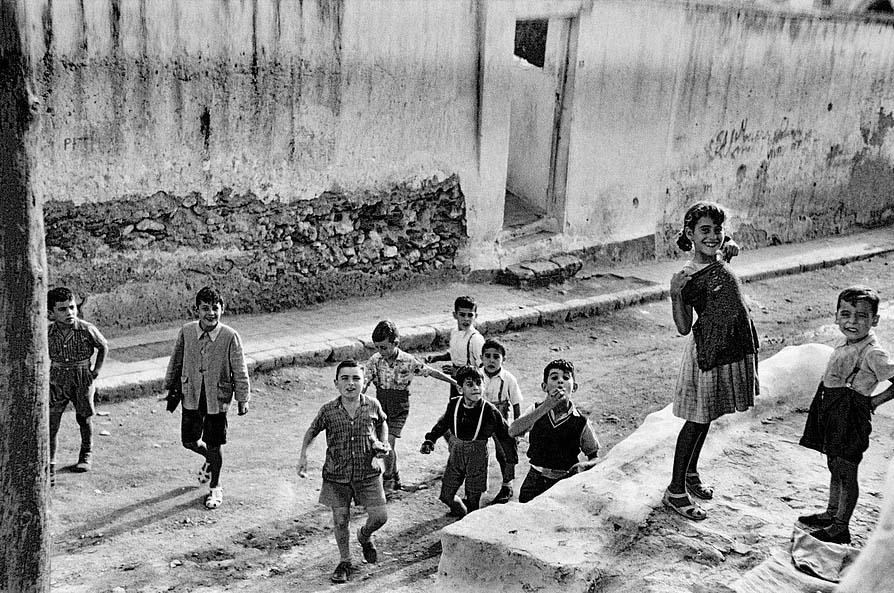
La nombran “La Briseña” por estar situada frente a la ciudad de Pechina, antigua Bayyana, floreciente puerto mediterraneo según relatan historiadores y geógrafos árabes del sigo X. La brisa del mar llegaba hasta la puerta de mi casa, de ahí su denominación en el pueblo de Benahadux, al que pertenece catastralmente, aunque está situado en El Ruiní, que era un lugar de reunión del más importante sufismo de entonces, donde se filosofaba de lo humano de este mundo y de lo divino del más allá.
No podía ser de otra manera que yo también tuviera después una cierta influencia sufí, o por lo menos de su tradición, no solo por reflexionar sobre la finitud de la vida sino también por dedicar mi ocio al mantenimiento de la casa, restaurando sus muros y respetando el paso del tiempo en los objetos que la habitan, ya que su entorno de luz dibuja cabalísticos signos en la cal de las paredes, provocando a veces originales visiones que procuro eternizar con mi pequeña cámara.
El lugar es apacible, ajeno a vecinos indiscretos, a ruidos y agobios, es el retiro ideal para enfrentarme a un paisaje austero, de espacios abiertos a la mirada, mientras escucho el trinar de los pájaros al alba y el canto de los grillos al atardecer, a la vez que riego mi personal jardín del desierto. Y es en esta paz, en ocasiones, cuando me viene a la memoria la sabia reflexión del poeta andalusí: “La mata de la albahaca que hay en mi casa es más preciosa para mí que el propio paraíso.”
(by Carlos Pérez Siquier)
//
More than forty years ago I had the wisdom to acquire from my family doctor, with a family of rank, a shepherd’s house segregated from the neighboring hacienda of the viscounts of Almansa. They name it “La Briseña” because it is located in front of the city of Pechina, ancient Bayyana, a flourishing Mediterranean port according to Arab historians and geographers of the 10th century. The sea breeze reached the door of my house, hence its name in the town of Benahadux, to which it belongs according the register, although it is located in El Ruiní, which was a meeting place for the most important Sufism of that time, where they philosophized about the human in this world and the divine beyond. It could not be otherwise that I also had a certain Sufi influence, or at least its tradition, not only for reflecting on the finitude of life but also for dedicating my leisure to maintaining the house, restoring its walls and respecting the passage of time in the objects that inhabit it, since its light environment draws cabalistic signs on the whitewash of the walls, sometimes provoking original visions that I try to eternalize with my small camera. The place is peaceful, oblivious to indiscreet neighbors, noise and stress, it is the ideal retreat to face an austere landscape, of spaces open to the gaze, while I listen to the chirping of the birds at dawn and the song of the crickets at sunset , while watering my personal desert garden. And it is in this peace, on occasions, that the wise reflection of the Andalusian poet comes to mind: “The basil bush that is in my house is more precious to me than paradise itself.”
(by Carlos Pérez Siquier)


























 “Color del Sur” recopila una selección de 40 fotografías de gran tamaño, que forman parte de las 70 imágenes de la exposición de Pérez Siquier y que recientemente han sido adquiridas por la entidad financiera Unicaja. Las imágenes fueron tomadas por el artista entre 1970 y 1980 en las localidades almerienses de Roquetas de Mar, Aguadulce, Playa Serena, Almerimar, Cabo de Gata, San José, La Isleta del Moro, las Negras y Rodalquilar y en las localidades malagueñas de Torremolinos y Marbella; así como entre 1990 y 2000 en la provincia de Almería.
“Color del Sur” recopila una selección de 40 fotografías de gran tamaño, que forman parte de las 70 imágenes de la exposición de Pérez Siquier y que recientemente han sido adquiridas por la entidad financiera Unicaja. Las imágenes fueron tomadas por el artista entre 1970 y 1980 en las localidades almerienses de Roquetas de Mar, Aguadulce, Playa Serena, Almerimar, Cabo de Gata, San José, La Isleta del Moro, las Negras y Rodalquilar y en las localidades malagueñas de Torremolinos y Marbella; así como entre 1990 y 2000 en la provincia de Almería. 


